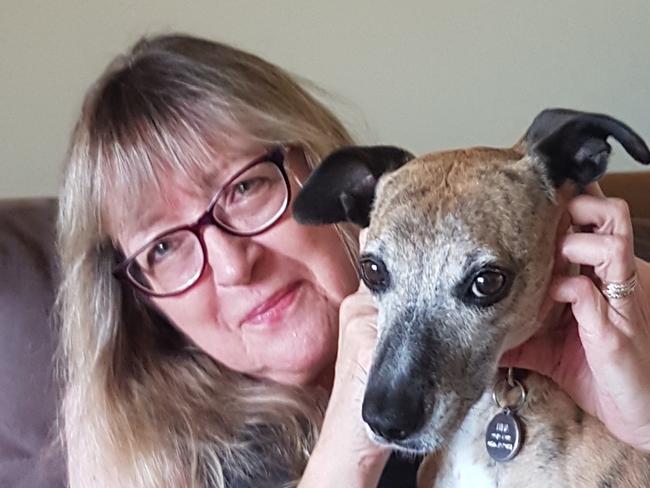Dr Kersti Seksel, veterinary specialist in animal behaviour answers your questions
Pets have played a big role in helping many people through the lockdown. But as restrictions ease, pets will be spending more time home alone. Veterinary specialist in animal behaviour, Dr Kersti Seksel, will be online to answer readers’ questions.

Hibernation
Don't miss out on the headlines from Hibernation. Followed categories will be added to My News.
- Master Builders Australia chief executive officer Denita Wawn answers your questions
- Australians looking for a ‘better normal’ post-COVID
The benefits of having a pet are not new to many Australians, but the COVID lockdown has seen the ranks of pet owners swell around the country.
Many people have welcomed new pets – particularly cats and dogs – into their homes during the past few months.
Having extra time at home has allowed people to spend more time training their pet and settling them in.
But as COVID lockdown restrictions ease, many of these pets will find themselves spending more time at home alone, as their families head back to school and work.
Dr Kersti Seksel is an internationally recognised veterinary specialist in animal behaviour at the Sydney Animal Behaviour Service, and Adjunct Associated Professor at Charles Sturt University.

She said pet owners should prepare their animals for the changes ahead. But it wasn’t just new pet owners who needed to be aware of the risk for separation anxiety.
Pets with previous issues with separation anxiety might experience symptoms again after spending so much time with their owners at home.
“We know that one in five dogs has some sort of anxiety disorder and that is just a genetic predisposition,” she said.
“And there’s no doubt that owners being anxious (especially about COVID) is going to make their dogs anxious.”
Dr Seksel said her Sydney clinic had been kept busy during the lockdown, and had also seen a spike in the number of cats with urinary tract infections – often a sign of stress or anxiety.
She said adjusting to the post-COVID world would be an adjustment for every human and their pets.
“It is a great unknown, who knows what the new normal is for us, let alone our pets,” she said.
Dr Seksel was online today to answer readers’ questions in an hour-long Q&A. Here’s what she had to say:
Q. What are the symptoms of separation anxiety and what is the best treatment?
A. Separation anxiety is common in dogs (and cats). Most of these pets have other signs of anxiety. In dogs you may see that they want to follow the owner everywhere, even to the bathroom, whine, pace, or become destructive when left alone. Cats tend to hide. Some of these pets also exhibit noise phobias like sensitivity to fireworks and thunderstorms. If it is mild then teaching the dog, or cat to be calm on cue can be helpful, along with synthetic pheromone analogues (Adaptil for dogs and Feliway for cats) or Zylkene (a milk by product). Both are available over the counter at your vet. If more severe then some pets need anti-anxiety medication so see your vet. Remember anxiety is a medical problem just like diabetes so professional help is important so that the pet does not suffer.
Q. We have had our puppy for four weeks now (he is a 10-week-old labrador). We have probably made a huge error in letting him sleep on our bed but we know he is going to get much bigger and it will be hard to have a full grown dog in our bed. We have also not left him home alone yet. What do you suggest we do?
A. Firstly, there is nothing wrong with pets sleeping in your bed as long as you do not mind the hair. I know on cold mornings my dog loves to snuggle in with us (and it keeps me warm but she is only 12kg and does not shed much). In fact that is probably where the saying three-dog night came from – how many dogs you need to keep you warm. If you want him to sleep elsewhere then now is a good time to start. Give him a bed that is comfortable. Encourage him to rest there during the day, perhaps even give him a treat for being there. Then place the bed next to your bed so he is still near you at night. Alternatively you could start with crate training. It should be his safe place to go when he needs to rest. Do it slowly and do not lock the door initially. I would also start with leaving him alone for very short periods. Video him so you can see what he does. This is where crates can be very useful too. The sooner you start the easier it will be for him to learn that being alone is a good time to rest and sleep.
Q. I got a toy poodle puppy when we went into lockdown. I am still working from home at the moment so have tried to do things to get her used to the idea that at some point, we won’t be home during the day. I have tried to have her outside with toys but she barks all the time. I also bought a pheromone collar but that didn’t work. Do you have any ideas on how to prepare her?
A. I would take a step back and put up a pen or baby gates in the house so she can see you but isn’t always with you. Otherwise they go from being with you all the time to a dramatic change of being left outside. The adjustment can result in a bit of whining and barking initially but you ideally only return to the room when she is quiet and toss treats to her when she is quiet on the other side of the barrier. If she is left in a pen when you go out you start with only doing short periods of putting her in it when feeding her, letting her eat a chew treat etc and then build up to leaving for longer periods. Video her when you do have to leave her home alone so you can seek help if she isn’t coping and adapting.
Q. We have had our staffy for five years and she has always been so placid. We have noticed that during the time we have all been isolated (we are a family of four and have two sons six and four) she has become a bit less tolerant of the boys and even become snappy on a couple of occasions. It is usually when she is out lying in the yard and they want to play and go and wake her up. Do you think she is sick of us being around all the time or could it be something more serious?
A. It is not unusual for dogs (and people) to get grumpy when there is too much going on and they do not have time to rest. Dogs, on average need at least 16 hours a day to rest and sleep. If everyone is home then your staffy just may not get enough rest. We all get irritable if we are sleep-deprived. So if she is sleeping ask the boys to let her be (“let sleeping dogs lie”). Give her a safe spot where she can rest without being disturbed. This can be a bed or a crate. Ask your boys to leave her until she wakes up and wants to engage. If after a week when she has caught up on rest and sleep she is still intolerant of the boys have your vet check her out as pain can also make us irritable.
Q. I have been working from home for the past three months and have had my new puppy for two of those. It has been hard to do much socialising given the COVID restrictions. Now that we have less restrictions we would like to get out more but I am not sure where to start. We went to the local dog part last weekend but it seemed a lot of the dogs were super aggressive and my puppy (who is now 18 weeks old and has had all her shots) was very nervous.
A. Dog parks are not ideal for a lot of dogs and particularly puppies. They can be very overwhelming, particularly now with people taking their dogs out more so there are more dogs in the park. It is best to go slow and make sure each experience is positive, otherwise you do the opposite of socialising your pup, you can make them more fearful. If you have friends or family with friendly dogs take the puppy for visits where it is one-on-one so less overwhelming and you can monitor and manage the interaction. If there are friendly dogs in your neighbourhood you could arrange for play dates with them. If you do go to the park try to go at quieter times when there are fewer dogs.
Q. I have been going to the same dog park for 10 years and in the past few weeks I have seen plenty of new faces with their ‘lockdown’ pets. And it seems the whole mood of the dog park has changed – the dogs seem to be way more excitable and there have been more dog fights than I have ever seen. It’s like the lockdown has made everyone a bit stir crazy, humans and animals. Am I imagining it and will it settle down? I have stopped going to the park for now.
A. You definitely aren’t imagining it. More people are out exercising their pets and emergency hospitals have seen an increase in dogfight victims. Dogs may be going to the park more than they usually would and probably seeing more dogs than they usually encounter. Good idea not going to the park for now. Hopefully things will settle down once we get back to ‘normal’ but that may take some time.
You can read more answers in the comments below
